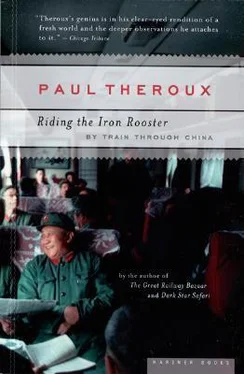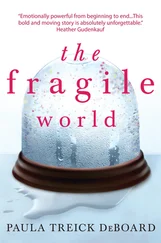It was not in the Tibetan's nature to be a robot. As nomads and the descendants of nomads; as hut dwellers in the emptiest region of the world, they were independent, and they were a great deal more self-reliant than the Lei Fengs. They were nearly always smiling, probably because they were either heading somewhere to pray or had just returned — prayers seemed to put Tibetans in a good mood. They seldom looked tired. They were brisk but they never hurried. They never ran. Unlike the Chinese they never nagged. They had made Lhasa a town of jolly pedestrians. They walked in the clean air through spindly winter-bare willows. They often stopped to admire the mountains. The mountains around Lhasa in new snow looked to me as though they had been made out of starched and crushed bedsheets, a mountain range of frozen laundry. Farther off the mountains were higher, bluer, and softened by the deeper snow. The snow represents holiness and purity to the Tibetans, whose glissading spirits need this symbol of innocence to prove they are still free: such snowy mountains are proof of God's existence.
You have to see Tibet to understand China. And anyone apologetic or sentimental about Chinese reform has to reckon with Tibet as a reminder of how harsh, how tenacious and materialistic, how insensitive the Chinese can be. They actually believe this is progress.
And yet, even with the policy of going too far, and the turbulence and damage in Tibet's recent history — the bombings, massacres, executions "for economic sabotage," oppressive nagging, crucifixions, tortures, desecrations, idiotic slogans, political songs, humiliations, edicts, insults, racism, baggy pants, army uniforms, brass bands, bad food, forced labor, compulsory blood donation, struggle sessions and pink socks — the scars hardly showed. Tibet had a way of looking inviolate. The mountains helped, but the people's attitude mattered most. They had found a way of distancing themselves from the Chinese, and they had done so in the most effective way, by laughing at them.
The most serious development in recent years is the Chinese discovery that Tibet is a tourist attraction. Tourists want monasteries. Tourists want temples and ringing gongs. Tourists adore monks. So the Chinese allowed Tibet to return, at least superficially, to its spiritual slumber. The Chinese doubled all the prices in Tibet. They welcomed Holiday Inn to run their best hotel, and they promised to rebuild the dynamited Ganden Monastery. There is a trickle of tourists; China has said it would like to have 100,000 a year. In that event, the destruction of Lhasa might be assured.
But it is a hard place to get to — six days overland from Xian, or else a long and frightening flight from Chengdu to Lhasa's small and dangerous airfield, which is so far from Lhasa that people must go there the night before if they have to catch a morning flight. These difficult journeys are part of the reason that Tibet has remained untouched. And the altitude can make even a strong person feel unwell — your head is two or three miles in the air most of the time. But the main reason Tibet is so undeveloped and un-Chinese — and so thoroughly old-fangled and pleasant — is that it is the one great place in China that the railway has not reached. The Kunlun Range is a guarantee that the railway will never get to Lhasa. That is probably a good thing. I thought I liked railways until I saw Tibet, and then I realized that I liked wilderness much more.
Quite by chance I saw Mr. Fu before I left Lhasa. He was anxious to show me that he had overcome his horror of snow and his altitude sickness. He was being an exemplary Lei Feng for a change.
Was there anything I wanted to see?
"Let's go for a drive," I said.
He slipped on his driving gloves. We set off alone. Miss Sun was in her room, playing cassettes, wagging her head to "I am a disco dancer."
"It is a lovely day," I said. It was clear and cold.
But I had a destination in mind — a gateway that was said to have been destroyed by Red Guards. I had read a clear description of it but it was not on any of the maps. Mr. Fu drove. We went past the carpet factory, and easterly past a ruined monastery; past barracks, past ugly Chinese houses, past barbed-wire fences. Dead dogs were flattened against the road — the wheels of Chinese army trucks had reduced the corpses to hairy stains. The red flags that flew were not prayer flags, which repeated mantras as the wind made them flap; they were army pennants.
Mr. Fu lost his way. In his confusion he became reckless. He drove too fast. There were more recently ruined cloisters with slogans on them. Mr. Fu began to gasp in impatience.
" Women chi le tai yuen, " he said. I think we have gone too far.
"You sure have," I said.
Surprised by hearing English, he gave me a wild look, as if I had made an unpleasant noise. He had already forgotten what he had said. He saw me frowning, and in fear he started to laugh.
This Chinese trip was so long and it had claimed so much of me that it stopped being a trip. It was another part of my life; and ending the travel was not a return but a kind of departure, which I regretted.
When I left Tibet some days later I lifted up my eyes to the mountains and clasped my hands and invented a clumsy prayer that went: Please let me come back.
*"Ah Q typifies all those who compensate themselves for their failures and setbacks in real life by regarding them as moral or spiritual victories." ( Scltcttd Works of Mao Zedong, vol. I, p. 282).
[back]
***
*Mao was often accused of being like the first emperor, Qin Shi Huangdi. His reply (in 1969) was: "Well, and what was so remarkable about Qin Shi Huangdi? He executed 460 scholars. We, we executed 46,000 of them!…You think you insult us by saying we are like Qin Shi Huangdi, but you make a mistake, we have passed him a hundred times!" (Simon Leys, Chinese Shadows )
[back]
***
*Even so, in June 1987 some Chinese looters were caught trying to sell a warrior's head to a foreign dealer for $81,000, in Xian, the death penalty was a certainty.
[back]
***
"These were the virtues of Confucius, as described by one of his disciples," runs the commentary in Mao's Selected Works. So Mao was also criticizing Confucius for not being of a revolutionary spirit.
[back]
***
Was a vindictive Chinese god listening to this? Perhaps. Exactly a year later, on June 20, 1987, a man from Texas was murdered on this very train by two Chinese men. The victim's name was Ewald Cheer. The motive was robbery ($i86). He was the first American to be murdered in China for forty years. His killers were quickly found guilty and executed.
[back]
***
She had the reason wrong Mao was the mover of a resolution to forbid the naming of provinces, cities, towns or squares for himself or other living leaders Selected Works of Mao Zedong, vol. IV, p 380).
[back]
***
During the Boxer Rebellion (1900) one of the chants went:
Surely government bannermen are many;
Certainly foreign soldiers a horde;
But if each of our people spits once.
They will drown bannermen and invaders together. Poems of Revotl. Peking, 1962
[back]
***
Confucius said, "The asking of questions is in itself the correct rite."
[back]












